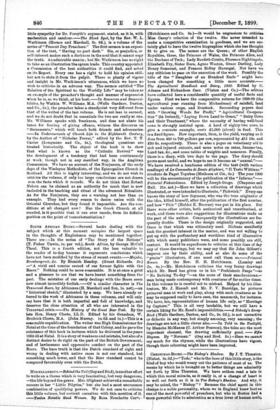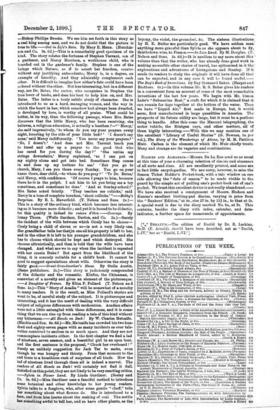Cianisames-Booxs.—The Bishop's Shadow. By J. T. Thurston. (Nisbet. 3s. 6d.)—"
Tode," who is the hero of this little story, is the kind of boy who would weary out the patience of most of us. The means by which he is brought on to better things are admirably set forth by Miss Thurston. We have seldom read a tale in which this moral miracle, as it really is, of a change of heart is so well set forth as it is in The Bishop's Shadow. And why, it may be asked, the " Bishop" ? Because the chief agent in this change is a noble personality, whom we in England knew best as one of the most powerful of preachers, but who in Boston had a morr powerful title to admiration as a true lover of human souls,
—Bishop Phillips Brooks. We see him set forth in this story as a real king among men, and we do not doubt that the picture is true to life.—Out in Life's Rain. By Mary E. Mann. (Hutchin- son and Co. 35. 6d.)—This is a remarkably good specimen of its kind. The story relates the fortunes of Stephen Tarrant, son of a gardener, and Mercy Morrison, a workhouse child, who is boarded out in the gardener's family. Stephen is one of the beings which Nature, as if to assert her freedom, creates without any justifying antecedents; Mercy is, in a degree, an example of heredity. And they admirably complement each other. It is difficult to imagine how either's fate could have been ordered without the other. Not less interesting, but in a different way, are Dr. Bates, the rector, who recognises in Stephen the true lover of books, and does his best to help him on, and Mrs. Bates. The latter is a truly subtle study of character. She is introduced to us as a hard, managing woman, and the way in which the heart in her, which somehow had always been dwarfed, is developed by love, is worthy of all praise. What could be better, in its way, than the following passage, where Mrs. Bates discovers that the little Mercy, who has been receiving, she believes, a religious education, is actually a heathen ?—" Mercy,' she said impressively, to whom do you say your prayers every night, kneeling by the side of your little bed ? " I doesn't say none,' said Mercy indifferently. You never say your prayers ? ' No, I doesn't.' 'And does not Mrs. Tarrant teach you to kneel and offer up a prayer to the good God who has cared for you during the day ? " She unties my strings downstairs,' Mercy explained, 'so I can put on my nighty alone and get into bed. Sometimes Step comes in and does up my buttons for me.' 'But you go to church, Mary, I see you there every Sunday. You go on your knees there, dear child,—to whom do you pray ? " To Dr. Bates,' said Mercy, with confidence. Of course I prays to him, because there he is in the pulpit. I ask him to let you bring me a toy sometimes, and sometimes he does.' 'And at Sunday-school ? '
Mrs. Bates asked faintly. They teaches me collicks,' said Mercy in a tone of complete boredom, short collicks.'"—Bobby's Surprises. By E. L. Haverfield. (T. Nelson and Sons. 2s.)— Phis is a story of the ordinary kind, which becomes less interest- ing as it becomes more didactic ; and yet it is bound to be didactic, for this quality is indeed its raison d'etre.—Courage. By Ismay Thorn. (Wells Gardner, Darton, and Co. 2s.)—Surely the incident of the wills between which Cicely has to choose— Cicely being a child of eleven or so—is not a very likely one. Her grandfather tells her that:in one all his property is left to her, and in the other it is left to his younger grandchildren, and she has to choose which should be kept and which destroyed. She chooses altruistically, and then is told that the wills have been changed. And what are we to say when the incident is repeated with her cousin Duke ? But apart from the likelihood of the thing, it is scarcely suitable for a child's book. It cannot be good to suggest speculations about wills. Otherwise the story is fairly good.—Great-Grandmother's Shoes. By Stella Austin. (Same publishers. 2s.)—This story is judiciously compounded of the didactic and the romantic. Kinfoo, the Chinaman, is somewhat of a novelty and gives an element of the picturesque. —A Daughter of Prance. By Eliza F. Pollard. (T. Nelson an d Sons. 6s.)—This "Story of Acadia" will be somewhat of a novelty to many readers. It is the result, as Miss Pollard's stories are wont to be, of careful study of the subject. It is picturesque and interesting, and it has the merit of dealing with the very difficult subject of religious differences with moderation. Acadian affairs were not a little entangled with these differences, and it is some- thing that we can rise up from reading a tale of this kind without any bitterness.—All Hands on Deck ! By W. Charles Metcalfe. (Blackie and Son. 3s. fid.)—Mr. Me tcalfe has crowded his two hun- dred and eighty-seven pages with as many incidents as ever tale. Writer contrived to enclose in so much space. And they are not commonplace incidents either. In the first chapter we find a lad of nineteen, seven seamen, and a beautiful girl in an open boat, and the first sentence is the proposal, "Chuck her overboard " Surely an unlikely suggestion for Jack Tar to make, even though he was hungry and thirsty. From that moment to the end there is a breathless rush of surprises of all kinds. How the lad of nineteen lived through them all is indeed a marvel. The readers of All Hands on Deck ! will certainly not find it dull. Satisfied on this point, they are not likely to be very exacting critics. —Sy/via in Flower Land. By Linda Gardiner. (Seeley and Co. 35. 6d.)—Miss Gardiner uses a fanciful method to introduce some botanical and other knowledge to her young readers. Sylvia talks to a foxglove, who, after some gentle "chaff," tells her something about what flowers do. She is introduced to a fern, and from him learns abortt the making of coal. The nettle has something awful to tell her, and so have other plants, as the bryony, the violet, the groundsel, &c. The sixteen illustrations by H. E. Butler are particularly good. We have seldom seen anything more graceful than Sylvia as she appears about to fly, thistledown-wise, to France.—/n Lion Land. By M. Douglas. (T. Neilson and Sons. 2s. 6c1.)—It is needless to say more about this volume than that the writer, who has already done good work in making accessible other stories of travel, has epitomised in it the explorations and adventures 0 Livingstone and Stanley. If it sends its readers to study the originals it will have done all that can be expected, and in any case it will be found useful.— The Boy's Book of Inventions. By Ray Stannard Baker. (Harper and Brothers. 6s.)—In this volume Mr. R. S. Baker gives his readers in a convenient form an account of some of the most remarkable inventions of the last few years. We begin with Mr. Simon Lake's "Submarine Boat," a craft for which it is claimed that it can remain for days together at the bottom of the water. Then we have "Liquid Air," first made in Europe, but, it would seem, first manufactured in large quantities in America. The prospects of its future utility are large, but it mast be a perilous thing to handle. After this come the Marconi telegraphing, the motor vehicle, the Röntgen rays, and other matters, all of them highly interesting. —With this we may mention one of the excellent "Library of Useful Stories" (G. Newnes, le. per vol.), The Story of the Wanderings of Atoms, by M. M. Pattison Muir. Carbon is the element of which Mr. Muir chiefly treats. Many and strange are its vagaries and combinations.























































 Previous page
Previous page